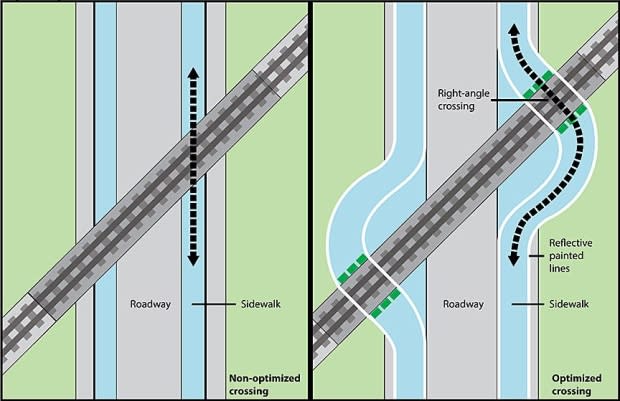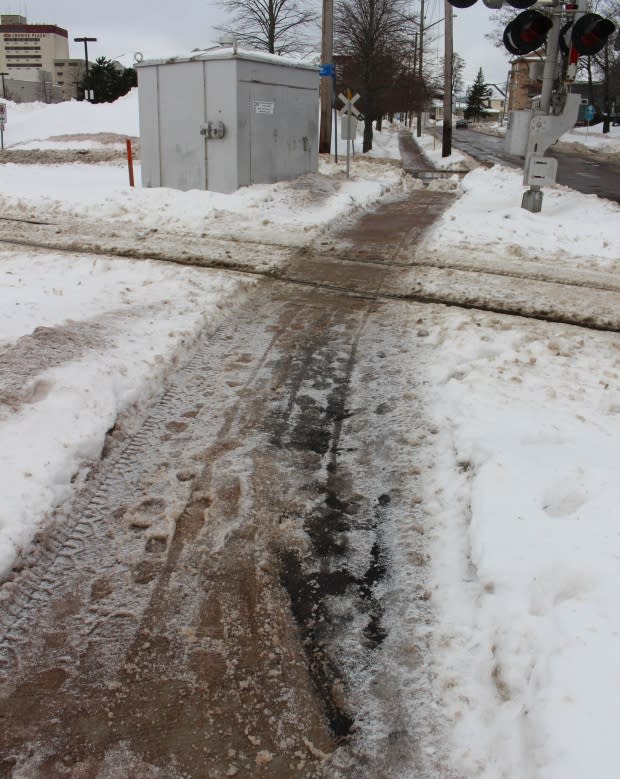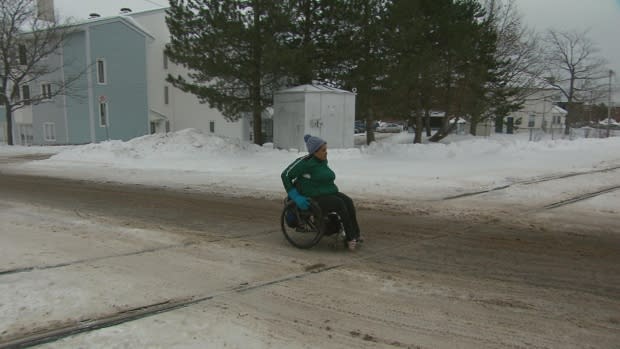Moncton's improved rail crossings 'kind of useless' in winter, wheelchair user says
Months after Moncton spent thousands to upgrade railway and sidewalk crossings to reduce the risk of wheelchairs getting stuck, winter snow clearing has essentially restored the original crossings.
Upgrades were carried out last year on both sides of Queen Street, the west side of Lutz Street and at the intersection of St. George and Church streets. The work changed the angle the sidewalks approach and intersect the rails, making them perpendicular to reduce the risk of wheels getting stuck.
A 29-year-old man, Steven Harel, was killed three years ago at a railway crossing when his motorized wheelchair became stuck. A report examining the causes of the crash called for changes to the angle sidewalks cross the rail line.
But city snow clearing hasn't matched the realigned crossings. On Lutz, following the realigned sidewalk leads into a snowbank. On the south side of Queen Street, the grey concrete sidewalk also disappears under the snow.

Christel Robichaud lives in an apartment building on Robinson Street that houses several people with reduced mobility.
On a recent day, Robichaud's blue-gloved hands gripped the edge of her wheelchair as she pushed herself across the CN rail line. But she was moving down the middle of Victoria Street, not the snowy sidewalk.
The para-athlete set to compete at the upcoming Canada Games considers the road safer than navigating city sidewalks in the winter.
"You just basically hope that no one is going to hit you," she said.

Robichaud expressed dissatisfaction with how the city maintains sidewalks in the winter and said she's not surprised about the issue at the upgraded crossings.
"In the wintertime, it's not really plowed from what I know, so it's kind of useless," Robichaud said.
Jeff Scott, a general foreman with the City of Moncton, said it appeared the issue stemmed from a lack of visual clues for city crews clearing the sidewalks after storms. When covered in snow, the new sidewalk route isn't apparent.

"We will look into this to see if we can refine our path a little better," Scott said.
He said city crews try to keep sidewalks as clear as possible in the winter and the city recently bought another machine to help in the downtown core.
The upgrades to the rail crossings came in 2018, the same year a Transportation Safety Board report examining the circumstances of Harel's death pointed to the angle of the sidewalks as a concern.
Harel's wheelchair became stuck at the Robinson Street crossing the night of July 27, 2016, when he was on his way home after watching movies at a friend's house. A train struck and killed him after he was stuck for about an hour.
Harel's mother Diane said she was pleased with the upgrades the city had carried out but was disappointed by what she saw this winter at the same crossings.
She wrote in an email that the communities should "be more aware of the sidewalk and make sure they're cleaned every single day. It's a priority for people with disability."
The Harel family is suing the city and CN over Steven's death.
The safety board report on Harel's death said that across the country, people with reduced mobility faced risks when using railway crossings and more needed to be done to ensure they remain safe.

"If crossings have uneven surface conditions, particularly if they intersect the railway tracks at an angle other than 90 degrees, swivel caster wheels on assistive devices can inadvertently rotate and drop into the flangeway gap and immobilize the assistive device, increasing the risk of a crossing accident," the report said.
In its report, the board said it is concerned with how far behind municipalities are on a plan established in 2014 to improve safety at all level crossings across Canada by 2021.
In response, Moncton last year implemented its own grade crossing standards to maintain pedestrian railway crossings at 90 degrees and carried out the upgrades with federal funding.
More upgrades are planned over the coming years at other intersections.
The Transportation Safety Board declined an interview.

